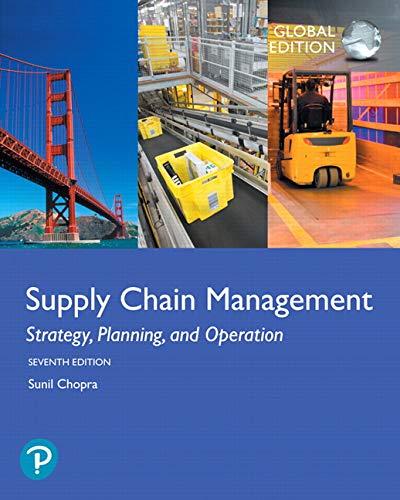Question
SUMMARIZ AND PARAPHRASE THE WRITTEN BELOW Facilities Facilities are the actual physical locations in the supply chain network where product is stored, assembled, or manufactured.
SUMMARIZ AND PARAPHRASE THE WRITTEN BELOW
Facilities
Facilities are the actual physical locations in the supply chain network where product is stored, assembled, or manufactured.
The two major types of facilities are production sites and storage sites.
Decisions regarding the role, location, capacity, and flexibility of facilities have a significant impact on the supply chain's performance.
For example, in 2009, Amazon increased the number of warehousing facilities located close to customers to improve its responsiveness.
2. Inventory
Inventory encompasses all raw materials, work in process, and finished goods within a supply chain.
Changing inventory policies can dramatically alter the supply chain's efficiency and responsiveness
For example, W.W. Grainger makes itself responsive by stocking large amounts of inventory and satisfying customer demand from stock even though the high inventory levels reduce efficiency.
Such a practice makes sense for Grainger because its products hold their value for a long time.
A strategy using high inventory levels can be dangerous in the fashion apparel business where inventory loses value relatively quickly with changing seasons and trends.Rather than hold high levels of inventory, Spanish apparel retailer Zara has worked hard to shorten new product and replenishment lead times.As a result, the company is very responsive but carries low levels of inventory.
3. Transportation
Transportation entails moving inventory from point to point in the supply chain.Transportation can take the form of many combinations of modes and routes, each with its own performance characteristics.
Transportation choices have a large impact on supply chain responsiveness and efficiency.For example, a mail-order catalogue company can use a faster mode of transportation such as FedEx to ship products. This makes its supply chain more responsive.
4. Information
Information consists of data collection and analysis concerning facilities, inventory, transportation, costs, prices, and customers throughout the supply chain.Information is potentially the biggest driver of performance in the supply chain because it directly affects each of the other drivers.
Information presents management with the opportunity to make supply chains more responsive and more efficient.For example, Seven-Eleven Japan has used information to better match supply and demand while achieving production and distribution economies.The result is a high level of responsiveness to customer demand while production and replenishment costs are lowered.
5. Sourcing
Sourcing is the choice of who will perform a particular supply chain activity such as production, storage, transportation, or the management of information.After Motorola outsourced much of its production to contract manufacturers in China, it saw its efficiency improve but its responsiveness suffer because of the long distances
6. Pricing
Pricing determines how much a firm will charge for the goods and services that it makes available in the supply chain.Pricing affects the behaviour of the buyer of the good or service, thus affecting supply chain performance.
For example, if a transportation company varies its charges based on the lead time provided by the customers, it is likely that customers who value efficiency will order early and customers who value responsiveness will order just before they need a product transported.
Step by Step Solution
There are 3 Steps involved in it
Step: 1

Get Instant Access to Expert-Tailored Solutions
See step-by-step solutions with expert insights and AI powered tools for academic success
Step: 2

Step: 3

Ace Your Homework with AI
Get the answers you need in no time with our AI-driven, step-by-step assistance
Get Started


